How to Eat in a Korean Restaurant Like a Local
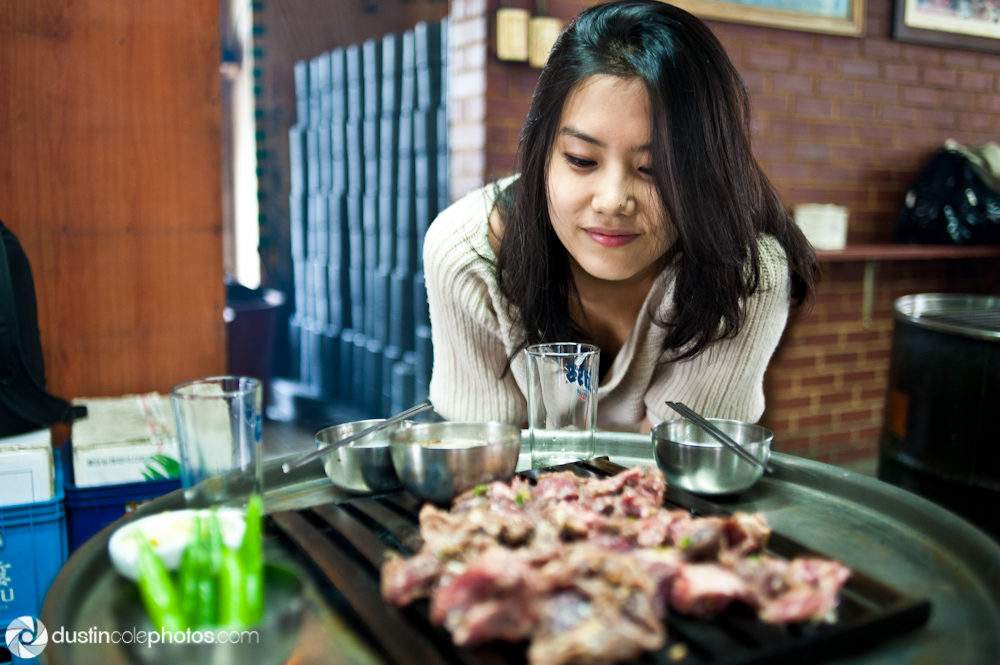
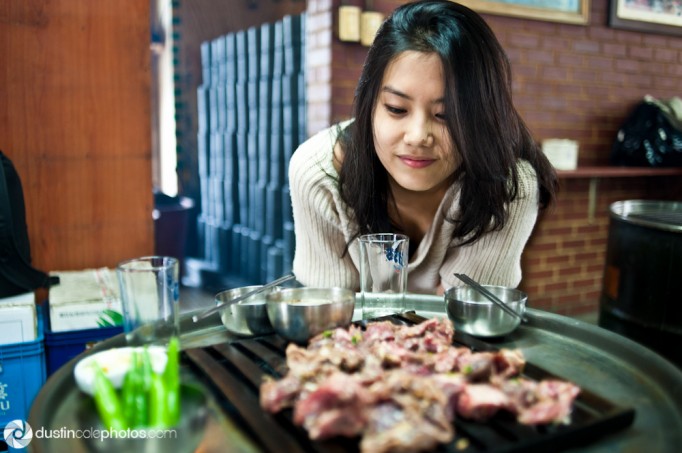
(Used with permission from Dustin Cole, a Seoul-based photographer)
If you’re traveling to Korea or are newly living in Korea, you’re most likely going to want to go to a Korean restaurant in Korea. But even a simple thing like asking for the check can make your servers chuckle. Make sure you don’t look like a fool by following this guide on how to eat Korean food like a local!
Note: These tips are for typical, local Korean restaurants in Korea. Western restaurants in Korea (i.e. Italian, steak, etc.) and more upscale (aka expensive) restaurants in Korea may not apply.
Sit Wherever You Like
Walk into a local Korean restaurant and take a seat. Most Korean restaurants in Korea, if not filled to capacity, won’t have a host or hostess to seat you. If there’s an open seat, it’s yours for the taking.
Get The Waitress’ Attention – Press a Button, or Really Get their Attention
Sitting at a table waiting for the waitress to come around? Raising your hand hoping to get their attention? Chances are you’ll be just as unnoticed as the quiet and nerdy kid sitting in the back of the classroom.
First thing’s first, look for a button on the table. And just like Field of Dreams, “if you press it, they will come.” If there is no button, make sure you’re not sheepish about calling them over. To get their attention, do as the Koreans do and say a nice, hearty jeogiyo (저기요 – excuse me) — be firm and confident. Don’t worry about being impolite. As long as you’re not screaming it, they’ll take it in stride.
Tip 1: Waiters/waitresses share in the serving duties (you’re not designated a server).
Tip 2: A friendlier way to address a waitress is to say eonni (언니 – older sister) or emo (이모 – auntie). Don’t worry, most men don’t care what you call them (seriously).
Find Utensils then Place on Top of a Napkin
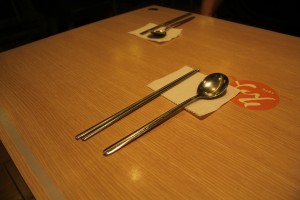
At local Korean restaurants in Korea, utensils are typically found at the table you’re sitting at. Look for a box with a lid on the table. Once you do find them, place a napkin on the table and put your utensils on top of it. Most Korean locals do this to ensure whatever is going into your mouth is clean. It’s not that the restaurants in Korea are unclean. It’s just an added level of security. Germaphobes unite!
Tip 1: Can’t find the utensils? Don’t forget to look under the table as well—they might be tidily placed in a drawer.
Share Your Food
Although this is an oxymoron for protecting oneself against germs, if you’re eating with locals at a Korean restaurant in Korea, be prepared to share your food. Korean culture places a lot of emphasis on sharing, and that means you’ll see a lot of different spoons in the same pot and ripping up large pieces of kimchi with chopsticks that were just in someone’s mouth. Don’t be freaked out, it’s bound to happen!
Tip 1: If you’re uncomfortable with this, people will understand. Ask for an extra dish (ap jeobshi – 앞 접시) and take what you need.
Drink Water at the End of the Meal
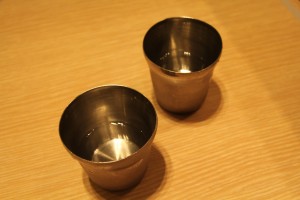
For local Korean people, water at a restaurant is usually only good for dabbing at that kimchi you spilled on your shirt. That is until the end of the meal when Koreans actually drink it. If you want to eat like a local at a Korean restaurant in Korea, wait till the end of your meal to drink water. Korean people have a belief that drinking too much water is bad for digestion, and most Korean people only drink about a cup or two at the end of their meals.
Tip 1: If you’re a human-camel, don’t worry. There’s nothing culturally wrong with drinking a lot of water at the table. It’s just not what local Koreans do. Drink up!
Tip 2: If you’re not given a container of water, water is most likely self-serve. Scan the restaurant, find the water cooler and get it yourself. Sorry, lazy people!
Find the Check and Pay Upfront
If you call over the waitress asking for the check and/or hand over your credit card to pay, you might get a laugh or two out of her. At most Korean restaurants in Korea, the check is already at the table. They just mark whatever you ordered and leave the tallied check on the table. And at most restaurants in Korea, you’ll have to bring that check to the front door to pay on your way out.
Tip 1: At a galbi restaurant in Korea? Check the metal ventilation tubes atop the BBQ. Sometimes the check is magnetically attached. Clever!
Got any other tips for eating like a local in a restaurant in Korea? Share with us in the comments below!

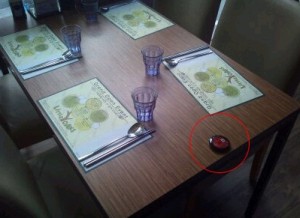
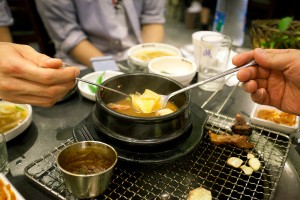




50 Comments
Hi Keith, great post! Just curious, guys will address the waitress as 누나, not 언니 right?
Actually, not really! 언니 is kind of a term used by everyone for a waitress. People older than the waitresses say it too. Guys will sometimes say 언니, but it is weird, so a lot of guys just say 저기요 too ^^. Great question!
What did you mean when you said the check is already at the table? The waiters/waitresses leave the check without you asking for it at the end of the meal?
Yea homie! They just leave it there…
Everyone if you’re into Korean soccer check out my homeboy victor’s website: http://southkoreansoccer.com 🙂 really good articles that I’m learning a lot from 🙂
Really, guys can say 언니 as well? I didn’t know that.
Just a quick question, some of my korean friends told me that Korean dont talk when they are dining.
They said it is impolite to do so, is that true?
The article is really informative and I learnt a lot.
Can’t wait to see the next post.
Hi Edwin.
Yup, guys say 언니 as well!
And I think your friend might be very, very traditional. Back, like 100 years ago, people were silent. But friends like to eat and talk 🙂
” Korean people have a belief that drinking too much water is bad for digestion”
There is a saying: ‘yoga drinking water before eating, regular people during the meal and idiots after eating’
translated from russian 🙂
we actually don’t say so 🙂 it was definitely some other language :)))
i should’ve practice this when i was in korea last winter.. aigoooooo~ its okay, gonna practice this the next time i go to korea again~
Ok! Now I want some kimchi and Bulgogi lol.
Hello,
Nice post. I’ll test it soon. 🙂 But I have a question: what about the tip? In my country it’s a must to leave a tip when you pay the check. How is it there?
Thank you!
No tip!
Hey Keith! I’m like obsessed with Korean culture thanks to your Youtube channel, and this site it feding my addiction! Love the site and the comedy within it makes it so much more interesting!
Your comment…what if I want to leave a tip?
No tip! ALWAYS No tip!! Just some sincere words of compliment are enough 🙂
we Koreans have doubts about unconditional gratitude because of the sad history.. and it might make them feel like they are beggars!
To get waitress attention, in Romanisation it’s “Yeogiyo” (over here), not “jeogiyo” (over there!)…
Actually, both are fine.
There is a problem with me yelling chogiyo to the ajummas. They automatically speak Korean to me (and I was in LA or SF), and I’m not Korean! Love kdramas but dunno the language. Anyway, then I would be lost and once they know I’m not Korean, they are back to ignoring me. At least this article explains a lot of the difficulties I faced eating at authentic Korean restaurants.
Nice and helpful, thanks a lot! What about the paying? Who is doing that if you’re sharing the meal? In my country it’s common to split the check, but is it seen as polite in Korea?
splitting check is fine, not rude. but someone might stand up and say ‘this one’s on me!’. when that happens, just put your wallet back in your pocket and say your words of gratitude to the person paying.
Hi Keith just a question, how do you ask for refills of banchan in korean?
Usually, there’s a bucket or something like that beside the table that’s fill with side dished! You can refills it by yourself.
이것 좀 더 주세요(ee gut jom duh juseiyo) please give me more of this
Calvin: Banchan door joosaeyo.
alight man. thanks alot paris!!
Michael – they actually do use ‘jeogiyo’. It’s like you’re calling to the person, so it’s like “you over there” rather than saying ‘yeogiyo’ asking them to come over.
안녕하셔요! Keith씨는 제 처음 한국어 선냉님이에요! 저는 일년 전에 매일 “Survival Phrases” 들었어요. Keith, thank you for your explanation. I got really confused when I heard for the first time a male customer call a waitress “언니”. I could not make any sense of it !
Hello there, I found your web site by way of Google even as searching for a similar topic, your web
site got here up, it appears great. I’ve bookmarked it in my google bookmarks.
Hello there, just become aware of your blog via Google, and located that it’s really informative.
I’m going to watch out for brussels. I will appreciate for those who continue this in future. Lots of other folks will likely be benefited out of your writing. Cheers!
How to Eat in a Korean Restaurant Like a Local | Seoulistic – Korea Simplified
I’m curious since you mentioned the sharing thing.
A friend of mine is half Korean and her mother (full Korean) has taken me out with them for Korean food a few times. Every time while we were eating my friend’s mother would roll up a bit of everything on a cabbage leaf and offer it to the ajjuma or ajjussi or the waiter/waitress currently at our table (and they’d chat in Korean as if they’d known each other their whole lives despite being much older or younger than her).
I’m curious to know if this is a normal practice in Korea. I assume it is since she was (according to my friend) born and raised in Seoul and the waiters and ajjuma/ajjussi welcome it so readily, I’m not sure though. I thought it rude to ask her and my friend claims it is, but she’s never been to Korea herself so I can’t take her word for it.
Please respond!
If you want to say “thank you” to a server, what politeness level to use:
1. Don’t know the sever?
2. Frequent customer so know the server, but not outside the restaurant?
3. The hostess or owner?
Thank you!
Quality articles is the crucial to attract the visitors to go to see the web site,
that’s what this web page is providing.
thanks for useful informaion. I’m a muslim and the main problem I face in korean resaurauns (in Tukey I have never been to korea but I plan) is pork… I’m sure there are few restaurants ın seoul making Halal food but I want to know whether there are places where I can eat not being bothered about accidentally eating pork. and also I’m in love withkorean street food culture but again not sure about their contents so can you tell me if it is safe for a muslim/jew to eat at those places. thanks again ^^
Thanks for a good information. However, one thing that Korean should keep in mind, in other countries, those things that you do in Korean restaurant are absolutely considered impolite such as seating anywhere you’d like or go up front to pay your bill.
I am 50’s and the Korean waitresses are 40’s. What would I call them “Ajumma”? Imo? I would not want to use a word that make the sound older than myself. Or is there some other word that means waitress? Thank You. This is a professional environment and is a place for office people to eat lunch.
아가씨(Agassi) would be alright. its dictionary definition is ‘unmarried female’ but we use it for calling any woman who looks like they are around their 20’s.
Is it okay to call the waitress eonni (언니) or imo even if you don’t know them?
Yes it’s ok 🙂
Holy crap there really is a little button to press hidden away in the corner lol.
Thanks for the tip!